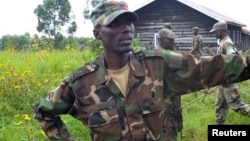GOMA —
Human Rights Watch has issued a report documenting recent executions and rapes by the M23 rebels in eastern Democratic Republic of Congo, as well as continuing support for the movement from Rwanda.
This is the second major report by Human Rights Watch on Congo’s M23 rebels, and it suggests their record has not improved.
It covers the period since March, when infighting between two factions of M23 resulted in defeat for one of the faction leaders, Bosco Ntaganda, who has since been transferred to the International Criminal Court in the Hague.
Under his rival Sultani Makenga’s leadership, the rebels have continued killing and raping, Human Rights Watch said.
"What we’ve documented is that war crimes committed by M23 fighters have continued since March, and those crimes include summary executions of at least 44 people and rapes of at least 61 women and girls, and forced recruitment of scores of young men and boys," commented Ida Sawyer, lead author of the report.
The report said 15 civilians were killed by M23 over two days in April, and another six in June, in reprisals for alleged collaboration with Congolese militias. It said other civilians killed by the movement included a man who refused to hand his sons over to the rebels, a motorcycle driver who refused to give them money, and recruits caught trying to escape.
It also mentioned forcible recruitments of men and boys from the Congo and Rwanda, and torture of prisoners of war, including two who were killed.
The researchers collected numerous testimonies to Rwanda’s continuing support for M23, with arms and ammunition, soldiers and recruits still crossing the border.
U.N. experts said recently that Rwandan support for M23 had dwindled since last year.
"It does appear that the support is more limited than it was last year, but what we have documented in terms of the support is still quite significant," Sawyer said. "Less support of full Rwandan army units crossing the border into Congo, but that support and influence is still very much continuing."
M23 was not immediately available for comment on the findings. The movement challenged a similarly damning HRW report last year, claiming the information was unfounded hearsay and rumor, not backed up with names of the victims and witnesses.
Human Rights Watch said it did not give names in order to protect its sources from possible harm.
"We’re very confident with our findings," Sawyer asserted. "What we’ve included in our report is only the information that we have confirmed with several credible witnesses. We rely on information from eyewitnesses who were present during the events, victims and witnesses to abuses. We do very in-depth interviews with all the people we speak to, to document this, and we don’t include information that we think may be biased."
No comments or reactions from the M23 are included in the latest report.
Sawyer said HRW had arranged to interview M23 leader Sultani Makenga about its findings, but fighting broke out on the day scheduled for the interview, and he canceled and was then not available for a phone interview.
This is the second major report by Human Rights Watch on Congo’s M23 rebels, and it suggests their record has not improved.
It covers the period since March, when infighting between two factions of M23 resulted in defeat for one of the faction leaders, Bosco Ntaganda, who has since been transferred to the International Criminal Court in the Hague.
Under his rival Sultani Makenga’s leadership, the rebels have continued killing and raping, Human Rights Watch said.
"What we’ve documented is that war crimes committed by M23 fighters have continued since March, and those crimes include summary executions of at least 44 people and rapes of at least 61 women and girls, and forced recruitment of scores of young men and boys," commented Ida Sawyer, lead author of the report.
The report said 15 civilians were killed by M23 over two days in April, and another six in June, in reprisals for alleged collaboration with Congolese militias. It said other civilians killed by the movement included a man who refused to hand his sons over to the rebels, a motorcycle driver who refused to give them money, and recruits caught trying to escape.
It also mentioned forcible recruitments of men and boys from the Congo and Rwanda, and torture of prisoners of war, including two who were killed.
The researchers collected numerous testimonies to Rwanda’s continuing support for M23, with arms and ammunition, soldiers and recruits still crossing the border.
U.N. experts said recently that Rwandan support for M23 had dwindled since last year.
"It does appear that the support is more limited than it was last year, but what we have documented in terms of the support is still quite significant," Sawyer said. "Less support of full Rwandan army units crossing the border into Congo, but that support and influence is still very much continuing."
M23 was not immediately available for comment on the findings. The movement challenged a similarly damning HRW report last year, claiming the information was unfounded hearsay and rumor, not backed up with names of the victims and witnesses.
Human Rights Watch said it did not give names in order to protect its sources from possible harm.
"We’re very confident with our findings," Sawyer asserted. "What we’ve included in our report is only the information that we have confirmed with several credible witnesses. We rely on information from eyewitnesses who were present during the events, victims and witnesses to abuses. We do very in-depth interviews with all the people we speak to, to document this, and we don’t include information that we think may be biased."
No comments or reactions from the M23 are included in the latest report.
Sawyer said HRW had arranged to interview M23 leader Sultani Makenga about its findings, but fighting broke out on the day scheduled for the interview, and he canceled and was then not available for a phone interview.











